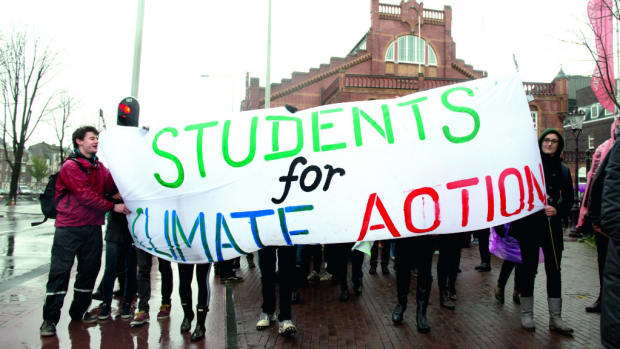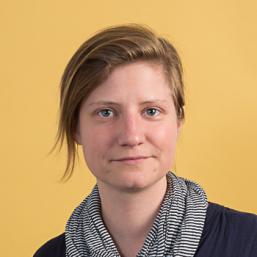
Paris is in the hot seat
Several thousand people joined the Peoples Climate March last Sunday, among them dozens of AUAS and UvA students. ‘A good turnout,’ says Manuel Allgaier, ‘especially given the pouring rain.’ The Environmental Studies undergraduate spent the last weeks going from one lecture hall to the next, trying to move students to action.
‘When I ask my class, “Who here cares about climate change?” virtually all hands go up,’ the 21-year old student from Germany says. ‘But when I ask who of them will be going to the demonstration, at most only about five of those hands are still showing. There is often a large gap between what we believe in and what we actually do.’
Since Monday, Paris has been the scene of the international Climate Change Conference; one that many feel is the most important convention of its kind in history. National leaders have gathered with the intended goal of reducing greenhouse gas emissions in order to curb the increase in global temperatures.
If they fail, disastrous consequences such as rising sea levels, extreme droughts, the extinction of many species and an unprecedented flows of migrants will be a reality in just a matter of time. During the last climate convention (which took place in 2009 in Copenhagen), world leaders were unable to come to any significant agreements. It is expected that they will do better this time around.
‘The saying is true,’ says Chaja Merk, Communication Management student at the AUAS: ‘ours is the first generation that is noticing the consequences of global warming, and the last one that can do something about it.’ It is for this reason that Merk, 26, intends to travel to Paris in the week of the conference, together with 19-year-old UvA-student Jessie Goldman. ‘To show that people actually care,’ Merk explains, ‘and to put some pressure on the negotiators.’
The fact that the largest climate demonstration to be held in Paris was cancelled after the terrorist attacks of 13 November will not stop them. ‘The attacks, terrible as they were, do not diminish the importance of this conference,’ says Goldman. ‘This concerns every person on Earth.’ Still, the two see remarkably little zeal for this cause in their peer group. Goldman: ‘People worry about climate change and global warming, but tend to see it as a given. They think it’s just a fact of life, something that can’t be helped. As if it were some horrible war in a faraway country.’
It’s an understandable reaction, according to social psychologist Lieke Dreijerink. Dreijerink researches students’ involvement with issues such as climate politics for Ivam, a UvA research and consultancy firm on sustainability. ‘Many students feel that their actions contribute little, if anything, to solving the problem,’ she says. This apathy is typical for an abstract problem like climate change, she explains. ‘People hardly notice the consequences in their daily lives. And if they do, those consequences are far away, or sometime in the future. That doesn’t provide much motivation for the present.’
Yet it is up to the current generation of students, Dreijerink says, to work towards a solution to these problems in the near future. ‘It would be a good idea if they learned more about meaningful actions and behaviour from the government or university, they should give the good example.’
Mirko van Pampus (28), assistant professor Future Planet Studies at the UvA, is giving it his best effort to make his students aware of the possibilities available to them, although he stresses that this is all strictly outside of the classroom. Together with a colleague, he has been mobilising as many students as possible to travel to Paris.
To this end, he started studentstoparis.nl, a website providing students with information about climate change as well as advice on how to get to Paris on the cheap and what they can do to help once there. He is hoping that this time, people might ‘get properly angry’, he says, ‘so that they’ll get up and say: “The way we run things is insane, it’s time you listen to us.” That’s the only way we might be able to make a change.’
Taking to the streets could indeed make a difference, Bert Metz confirms. And as an internationally respected authority on climate policy, he should know. He co-chaired the Working Group on mitigation on climate change of the United Nations’ scientist climate panel IPCC that lays the scientific foundations for climate conferences, and was one of the members of the UN workgroup to accept the Nobel Peace Prize in 2007.
‘When many people show a willingness to march through the streets, it demonstrates that they really care whether something is accomplished,’ Metz says. ‘This helps politicians realise that it does matter to the electorate whose continuing support they will need in the future.’
Apart from demonstrating, there are many other ways students can take action to mitigate climate change. ‘Taking up a more sustainable lifestyle is one way. But you could also check if your university invests in fossil fuel industries and say something about it if it does. That way you can force companies to change their policies.’
And it’s always a good idea to check up on how your university runs itself, says Metz. ‘How energy effi cient are their buildings? Do these issues feature suffi ciently in their degree programmes and studies? These are responsibilities universities should definitely be taking.’ Metz recommends that students who want to take action should participate in NGOs, political parties or communities.
Taking slightly shorter showers, choosing to bike instead of driving, buying less energy-consuming devices and eating less meat is all very well, but when all is said and done, we will need to do more, Metz and Van Pampus agree. ‘Historical change has never happened of its own accord,’ the latter says. ‘Be it gay marriage, civil rights in the United States or women’s votes: each significant change was enforced through some form of activism.’
He takes the debate surrounding Black Pete as an example. ‘Ten years ago this wasn’t an issue even to progressive Dutch people. Now we are certain it will change. We’re not there yet, but we will definitely never return to the way things were.’ He observes a similar development in the discussions about climate change. ‘The question isn’t: “Is it useful to participate?” but rather, “Do you want to be a part of making the change or not?”’
Still, we have a way to go, says Van Pampus. That’s why he feels it is crucial that students gain experience in activism. ‘It would be a very good thing for many of them to feel what it’s like to be out in the streets with a hundred thousand other people and make their opinion heard.’
Manuel Allgaier participated in his first climate march last year and was hooked from the outset. ‘You have people from all over the country coming together with the same goals.’ All exchange ideas share how they are committed to the cause. ‘It’s very inspiring,’ Allgaier says. ‘You get a strong sense that it is possible for us to make a change after all.’ And – not unimportantly – the march invariably ends in a great party, ‘where you can really go all out. Literally everyone dances together.’

